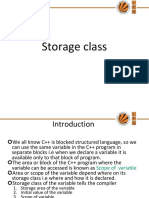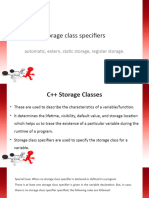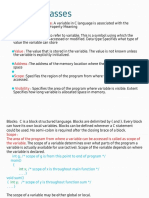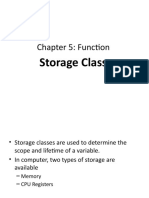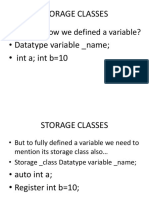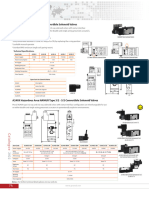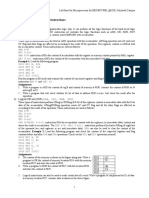0% found this document useful (0 votes)
109 views13 pagesStorage Classes
Storage classes in C++ determine the accessibility and lifetime of variables. There are four main storage classes - automatic, external, static, and register. Automatic variables are local to the function they are declared in and are created and destroyed each time the function is called. External variables have global scope and persist for the lifetime of the program. Static variables retain their value between function calls and also persist for the lifetime of the program. Register variables are stored in CPU registers for fast access but cannot have their addresses taken.
Uploaded by
ajameel.89Copyright
© Attribution Non-Commercial (BY-NC)
We take content rights seriously. If you suspect this is your content, claim it here.
Available Formats
Download as DOC, PDF, TXT or read online on Scribd
0% found this document useful (0 votes)
109 views13 pagesStorage Classes
Storage classes in C++ determine the accessibility and lifetime of variables. There are four main storage classes - automatic, external, static, and register. Automatic variables are local to the function they are declared in and are created and destroyed each time the function is called. External variables have global scope and persist for the lifetime of the program. Static variables retain their value between function calls and also persist for the lifetime of the program. Register variables are stored in CPU registers for fast access but cannot have their addresses taken.
Uploaded by
ajameel.89Copyright
© Attribution Non-Commercial (BY-NC)
We take content rights seriously. If you suspect this is your content, claim it here.
Available Formats
Download as DOC, PDF, TXT or read online on Scribd
/ 13



